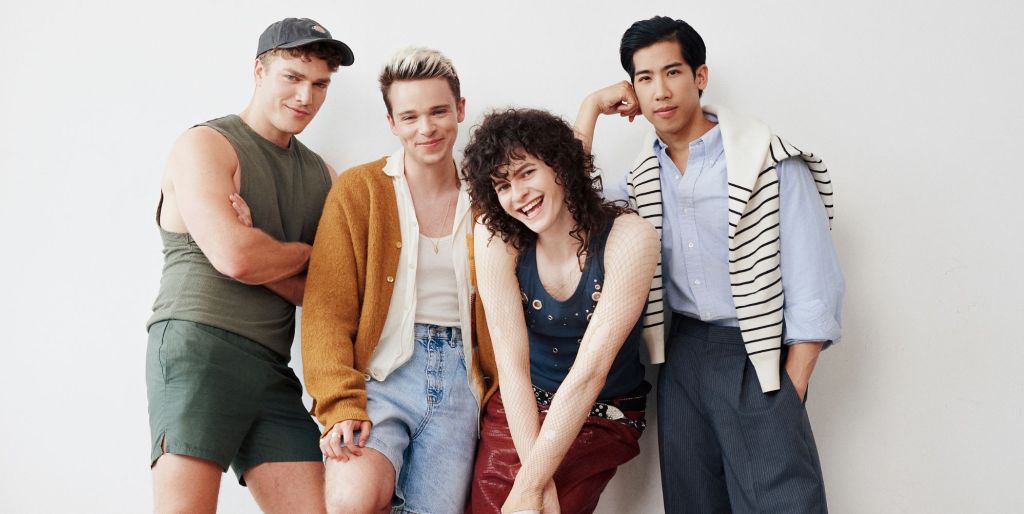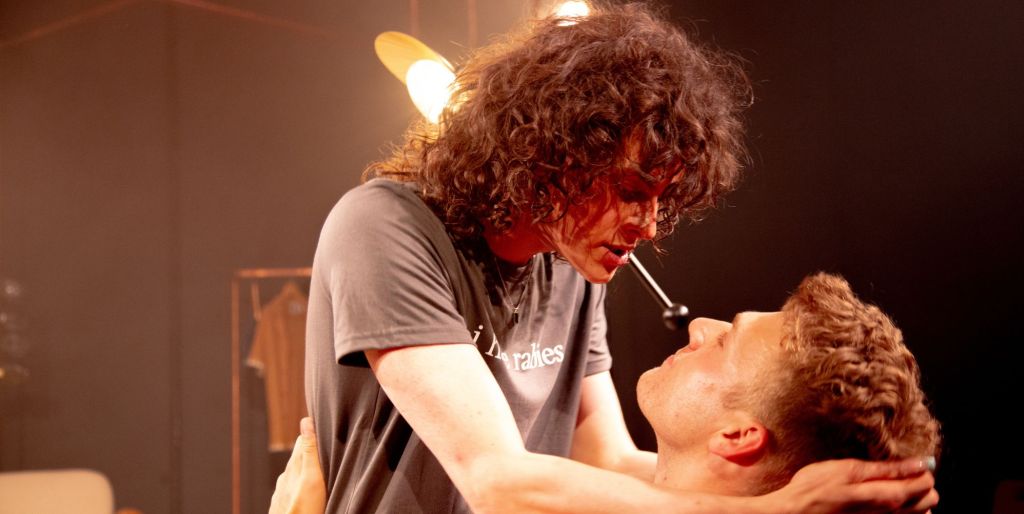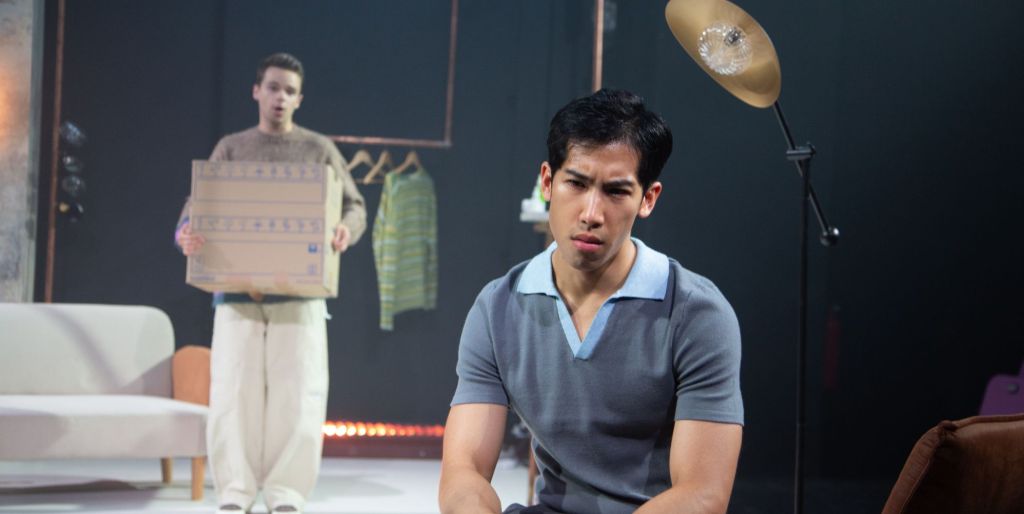RuPaul once claimed that there is “no such thing as monogamy”. Margaret Cho believes the prospect of only having sex with one person in life is “gross”. Angelina Jolie has said that fidelity isn’t “essential” to a happy relationship.
Over the last decade in particular, the open relationship has nestled its way into the 21st century’s love landscape, yet it remains a thorny subject.
“Everyone I meet nowadays is in an open relationship,” says Jo Foster, star of West End musical Why Am I So Single?, and now one of four leads in the revival of Jake Brunger’s play Four Play. “I think people our age, like, it’s more common to be in an open relationship than to be in a monogamous one,” agrees Foster’s co-star and former Mean Girls actor, Daniel Bravo.
Foster and Bravo play Andy and Michael in Four Play, a long-term couple bound by the rules of their open relationship: they can sleep with other people, so long as they’re not friends, it’s never more than once, and no details are shared. Yet Michael is far looser with these parameters than Andy, and so an intriguing offer from their mutual friends Rafe and Pete (Lewis Cornay and Zheng Xi Yong) proves incendiary.

After seven (and a half) years together, and having never had sex with anyone else, Rafe and Pete are looking for a one-time rendezvous, and Michael – handsome, brawny, shamelessly sly – is the perfect fit. He’s got form, Andy never needs to know, and then Rafe and Pete can carry on their flimsily-maintained monogamous relationship – if Pete can bear it. For the bulk of it, Four Play blares like a siren warning against the dicey territory of open relationships. Yet by the end, it’s less a didactic deterrent, and more a question of what it takes for such a set up to work.
“I don’t think the takeaway is that open relationships are awful and will never work, because that’s just untrue,” says Foster. Instead, and somewhat ironically, here are four people who are being anything but open with each other. Their needs and desires are mismatched and unspoken. “The main thing that causes the breakdown of [Andy and Michael’s] relationship is [no] communication and not being honest with the other person about where they’re at,” says Bravo. “I don’t actually think it is about monogamy or non-monogamy.”
Four Play, frequently described as a “provocative comedy”, was written by Brunger in 2014 as part of The Old Vic’s “Old Vic New Voices” scheme. One year on from the legalisation of gay marriage in the UK, Brunger was tasked with writing a “state of the nation gay play”. Yet as the nation brimmed with gay people finally able to get wed and have children, Brunger saw friction between these new-found rights and what gay folk had been told for years: their relationships shouldn’t be defined by heteronormative ideals.

The show – teeming with funny one-liners, dramatic enough to evoke several gasps – has since been staged several times. Yet this interaction comes a decade after the first, with its original director Jack Sain back onboard, and the state of the gay – or rather, queer – nation having evolved quite some way. What was four gay men is now three gay men and one genderqueer person in Andy (Foster is also genderqueer), though the worldview on relationships and identity has extended far beyond language used.
The irrepressible rise of on-demand sex via dating apps, for one. “That accessibility has shifted things,” says Bravo, and “even if people are in a monogamous relationship, it’s probably a tougher thing to just really commit to that”. The prospect of sex being so readily accessible could have even led to slight alienation of those who do opt for monogamy.
“In the media we consume and stuff, now it does feel a bit more like, ‘Oh how boring to be [monogamous],’” says Cornay. “Which is strange, because 10, 15 years ago it was rebellious to be in a same-sex relationship.” Yet Bravo wonders if, rather than being rebellious, queer couples of yesteryear were simply feeling more “pressure” to “live a bit more of a heteronormative life and have a settled marriage and have three kids,” whereas now depicts the rebellion in action. “I think open relationships are something that aren’t this crazy, radical, scary thing that they maybe were.”
Of course, non-monogamy isn’t exclusive to queer folk. The audience at the King’s Head Theatre in London, where Four Play is currently being staged, has been peppered with straight couples, Bravo says, and he’s heard from them directly that the difficulties faced by Michael, Andy, Rafe and Pete impact them, too. “A lot of the things that they talk about are issues that straight couples face as well,” agrees Yong. “Like, being in different stages of your life, fidelity, boundaries, communication, what you expect from relationship, friendship, betrayal.”

Stepping into character every night has left all four actors reflecting on their own relationships, past, present and future. When Yong first read the part of the brusk Pete, he “completely hated him”. But weeks of rehearsals, and then bringing him to an audience, has changed that. “I’ve started to understand Pete more and empathize with him,” Yong says. “I’m a flawed person as well and I’ve gone through things in my relationships, which maybe I’m not that happy about.”
After one performance, the actor went home and “started bawl-crying… I had to talk to my therapist about it the next day”. He discovered that this character he had vehemently despised actually shared some of his own traits. “It was a bit like holding a bloody mirror up to myself. I found that quite difficult.” Bravo similarly discovered that he related to Michael in some way. “He’s kind of an addict in some senses and I don’t think I’m that, but there are things about him and the way that he functions within the relationship which I think I can relate to slightly,” he shares. “It’s been really challenging to me about how I would navigate this kind of setup.”
Cornay and Foster have equally contended with whether open relationships are more workable than they oringally thought. “I think maybe that open relationships really can work… you just have to be so communicative,” says Cornay, though he admits he’d find one difficult.
“I always think about, ‘How would I be in that situation?’,” Foster ponders. “Would I be quite jealous even though jealousy is such a social construct that we’ve created as humans?” Jealous that their partner is sleeping with someone else, perhaps, but as Foster’s character Andy discovers, jealousy can calcify into insecurity. Why did Rafe and Pete choose Michael for their sexperiment, not Andy?

In Four Play’s programme, Brunger apologies for any awkward conversations it may cause between couples on the way home. Yet he really shouldn’t: if the show teaches anything, it’s that we should talk more, not less.
“It can open up conversations that people might not feel necessarily safe to bring up,” Conway suggest, “because they’ve got this as a conversation starter.” There’s plenty of conversation to be had: are sex and intimacy two different things? Is it possible to suppress sexual desires in favour of monogamy, or is RuPaul right that monogamy is a form of “cheating yourself”?
“I just would love people’s ideas of what a relationship is and should be to just be challenged a little bit,” says Bravo.
“I would like to think that the play paints a picture as to how how we can do relationships differently in a way that values and prioritises our partner as well as our own urges and desires.”
Four Play is at the King’s Head Theatre in London until 17 August. Tickets available now.
Share your thoughts! Let us know in the comments below, and remember to keep the conversation respectful.
